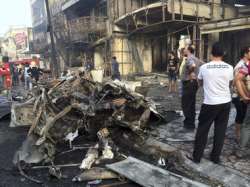Baghdad: Bombs went off Saturday midnight in two crowded commercial areas in Baghdad, killing at least 119 people and wounding over 200 , according to hospital and police officials.
The bombings came near the end of the holy month of Ramadan when the streets were filled with young people and families out after sundown.
In the first attack, a car bomb exploded in the Karada district in central Baghdad, killing dozens of people, the death toll is rising and has not been confirmed.
Karrada,a Shiite-majority neighborhood, was busy at the time as Iraqis eat out late during the Muslim fasting month of Ramadan, which ends next week.
Iraq Prime Minister Haider al-Abadi toured the site of the blast Sunday morning.
A video posted on social media showed a large blaze in the main street of Karrada after the blast. Reuters TV footage taken in the morning showed at least four buildings severely damaged or partly collapsed
Shortly afterward, an improvised explosive device went off at a market in east Baghdad's al-Shaab, a popular Shi'ite district in the north of the capital. The officials who provided the casualty figures spoke on condition of anonymity as they were not authorized to release information.
The Islamic State group claimed responsibility for the attack in the Karada district in a communique distributed on Telegram and Twitter, according to the SITE Intelligence Group which monitors jihadi online activity. The communique said a suicide car bomber targeted Shiites.
There was no immediate claim of responsibility for the second bombing.
Nearly an hour after the attack in central Baghdad, ambulances could still be heard rushing to the site. An eyewitness said the explosion set off fires at nearby clothing and cell phone shops.
The Baghdad attacks come just over a week after Iraqi forces declared the city of Fallujah "fully liberated" from IS. Over the last year, Iraq forces have racked up territorial gains against IS, retaking the city of Ramadi and the towns of Hit and Rutba, all in Iraq's vast Anbar province west of Baghdad.
Despite the government's battlefield victories, IS has repeatedly shown it remains capable of launching attacks far from the front-lines.
IS still controls Iraq's second largest city of Mosul as well as significant patches of territory in the country's north and west.
At the height of the extremist group's power in 2014, IS rendered nearly a third of the country out of government control.
Now, IS is estimated to control only 14 percent of Iraqi territory, according to the office of Iraq's prime minister.
Latest World News
